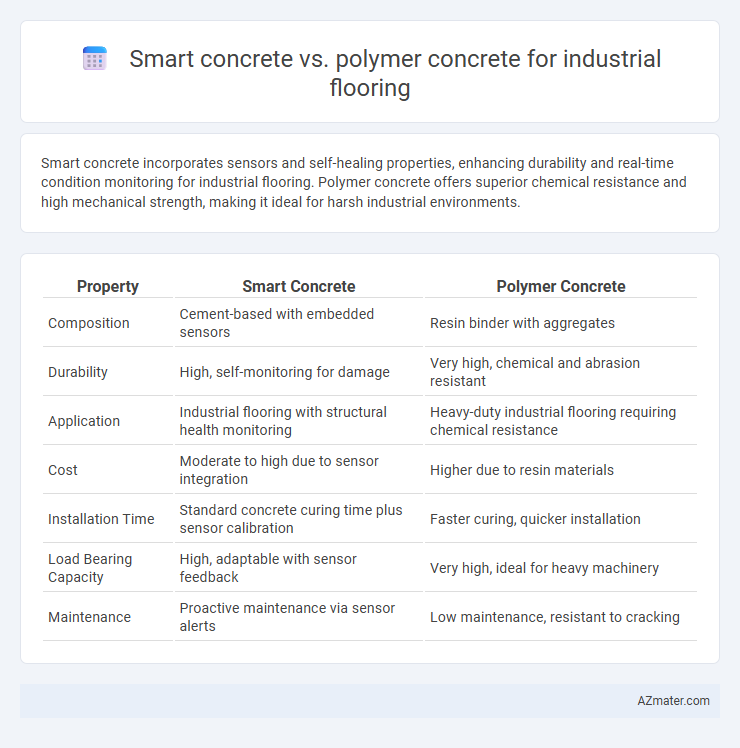Smart concrete incorporates sensors and self-healing properties, enhancing durability and real-time condition monitoring for industrial flooring. Polymer concrete offers superior chemical resistance and high mechanical strength, making it ideal for harsh industrial environments.
Table of Comparison
| Property | Smart Concrete | Polymer Concrete |
|---|---|---|
| Composition | Cement-based with embedded sensors | Resin binder with aggregates |
| Durability | High, self-monitoring for damage | Very high, chemical and abrasion resistant |
| Application | Industrial flooring with structural health monitoring | Heavy-duty industrial flooring requiring chemical resistance |
| Cost | Moderate to high due to sensor integration | Higher due to resin materials |
| Installation Time | Standard concrete curing time plus sensor calibration | Faster curing, quicker installation |
| Load Bearing Capacity | High, adaptable with sensor feedback | Very high, ideal for heavy machinery |
| Maintenance | Proactive maintenance via sensor alerts | Low maintenance, resistant to cracking |
Introduction to Industrial Flooring Solutions
Industrial flooring solutions require materials with high durability, load-bearing capacity, and resistance to chemicals and abrasion. Smart concrete integrates sensors and self-healing properties, enhancing structural health monitoring and longevity in industrial environments. Polymer concrete offers excellent chemical resistance and rapid curing times, making it ideal for areas exposed to harsh substances and demanding quick installation.
Understanding Smart Concrete
Smart concrete integrates sensors and self-healing materials to enhance durability and monitor structural health in real-time, making it ideal for industrial flooring requiring continuous performance assessment. Polymer concrete uses synthetic resins as binders, offering chemical resistance and rapid curing but lacks the adaptive capabilities present in smart concrete. Understanding smart concrete's embedded technology is crucial for industries prioritizing predictive maintenance and extended floor lifespan.
Overview of Polymer Concrete
Polymer concrete is a composite material consisting of resin binders and aggregates, offering superior chemical resistance and mechanical strength compared to traditional concrete. Its rapid curing time and high durability make it ideal for industrial flooring exposed to heavy loads and corrosive environments. Enhanced bonding properties allow polymer concrete to provide a seamless, crack-resistant surface, minimizing maintenance costs in high-traffic industrial settings.
Key Material Properties Comparison
Smart concrete for industrial flooring offers enhanced self-healing properties and improved durability through embedded nanoparticles and fibers, providing superior crack resistance and longevity. Polymer concrete exhibits excellent chemical resistance and faster curing times, making it highly suitable for industrial environments exposed to harsh chemicals and heavy mechanical stresses. Both materials demonstrate high compressive strength, but smart concrete's adaptive features provide a longer service life, while polymer concrete excels in rapid installation and chemical durability.
Durability and Longevity
Smart concrete incorporates nanomaterials and self-healing agents that enhance its durability by autonomously repairing micro-cracks, resulting in superior longevity for industrial flooring compared to traditional materials. Polymer concrete combines resin binders with aggregates to provide excellent chemical resistance and high strength, but may experience reduced durability under UV exposure and mechanical stress over extended periods. For industrial flooring requiring optimal durability and long-term performance, smart concrete offers advanced self-repair capabilities that extend service life beyond polymer concrete alternatives.
Performance in Harsh Environments
Smart concrete incorporates nanomaterials and sensors, enhancing durability and real-time structural health monitoring in industrial flooring exposed to harsh environments. Polymer concrete offers chemical resistance and high abrasion tolerance, making it suitable for floors facing aggressive chemicals and heavy mechanical stress. Both materials excel in durability, but smart concrete's embedded technology provides an advanced edge in predictive maintenance and long-term performance under extreme conditions.
Cost Effectiveness and Life Cycle Analysis
Smart concrete offers enhanced durability and self-healing properties, reducing maintenance costs over an industrial flooring's lifespan, while its initial installation cost is higher compared to polymer concrete. Polymer concrete provides rapid curing and high chemical resistance, leading to lower upfront expenses but may require more frequent repairs due to lower crack resistance. Life cycle analysis favors smart concrete for long-term savings through extended service life and minimized downtime, whereas polymer concrete suits budget-sensitive projects with shorter operational periods.
Installation and Maintenance Considerations
Smart concrete for industrial flooring offers enhanced durability and self-healing properties, reducing maintenance frequency and downtime compared to polymer concrete. Polymer concrete provides faster installation times due to its rapid curing process, making it suitable for projects with tight schedules, but may require more frequent maintenance in heavy-load environments. The choice between the two depends on balancing installation speed with long-term maintenance costs and performance requirements in industrial settings.
Sustainability and Environmental Impact
Smart concrete incorporates nanomaterials and sensors to enhance durability and monitor structural health, reducing maintenance frequency and resource consumption, thus promoting sustainability in industrial flooring. Polymer concrete, made with resin binders and aggregates, offers chemical resistance and faster curing times, but its reliance on non-biodegradable polymers can pose environmental disposal challenges. Selecting smart concrete supports long-term environmental benefits through reduced material waste and improved lifespan, while polymer concrete's impact depends on resin type and recyclability practices.
Choosing the Right Concrete for Industrial Floors
Smart concrete incorporates self-healing properties and embedded sensors, enhancing durability and real-time structural monitoring, which reduces maintenance costs for industrial floors. Polymer concrete offers superior chemical resistance, high strength, and rapid curing times, making it ideal for environments exposed to harsh chemicals or heavy mechanical loads. Selecting the right concrete depends on specific industrial requirements, such as maintenance needs, exposure to chemicals, mechanical stress, and long-term performance expectations.

Infographic: Smart concrete vs Polymer concrete for Industrial flooring
 azmater.com
azmater.com